A world where digital payments become seamless, transforming the way we handle money daily. The CEO of PayPal has been at the forefront of this revolution, steering one of the most influential platforms in financial technology. From its humble beginnings to its global dominance, PayPal’s leadership has shaped its journey.
Each CEO brought unique strategies that impacted the digital payments realm and beyond. Whether you’re curious about the company’s history or its visionary direction, this article dives deep into the leaders who made PayPal what it is today.
History Of PayPal Leadership
PayPal’s leadership journey is a story of strategic decisions, resilience, and innovation. Since its establishment, the company has seen a series of transformative leaders who have played pivotal roles in building its reputation as a global leader in digital payments.
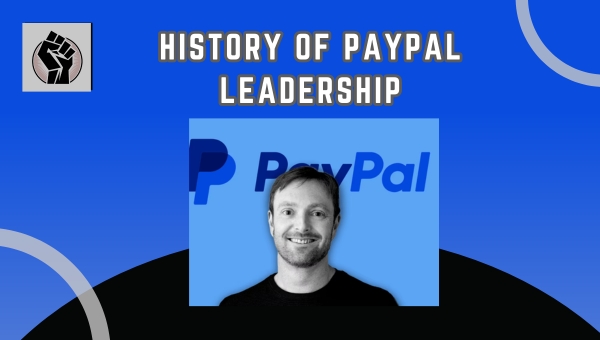
This section delves into the origins of PayPal and the transitions that shaped its leadership over the years.
Founding And Early Leadership
PayPal was founded in 1998 by Peter Thiel and Max Levchin, with the initial aim of enabling money transfers between Palm Pilot devices. This pioneering idea set the foundation for a company that would eventually revolutionize digital payments.
During its formative years, Thiel, as the first CEO, focused on combating fraud—a critical issue for the nascent platform—and forging partnerships that were essential for growth.
A significant turning point came in 2000 when PayPal merged with Elon Musk’s company, X.com. Musk’s influence brought a new vision and technological ambition, but his tenure as CEO was short-lived due to differing priorities with the board.
This early phase of leadership was marked by rapid growth, internal challenges, and key decisions that would establish PayPal as a disruptor in the financial technology space.
Transition To Prominent CEOs
After the early founders, PayPal underwent a series of leadership changes that brought in more seasoned executives to steer the company through its next phases. Elon Musk, despite his brief time at the helm, introduced ambitious ideas that laid the groundwork for future technological advancements.
Following his departure, Peter Thiel returned temporarily to stabilize operations and guide the organization through its integration with eBay after the 2002 acquisition.
As the company matured, the leadership baton passed to professional executives. Leaders like Bill Harris and Jeff Jordan implemented policies to enhance compliance, improve customer experience, and expand PayPal’s user base.
These transitions reflected a shift from founder-led decision-making to a more structured, corporate approach, ensuring PayPal’s sustained growth and its ability to adapt to evolving market demands.
Also Read: Credit Cards: The Evolution You Need To Know
Notable CEOs Of PayPal
The CEOs of PayPal have played pivotal roles in shaping the company into a global leader in digital payments. Each leader brought a unique approach to management, innovation, and strategy, leaving a lasting impact on the company’s trajectory. Below is a detailed look into the contributions and achievements of PayPal’s most notable CEOs:
Peter Thiel (1998–2000)
Peter Thiel, a co-founder of PayPal, served as its first CEO. His tenure was essential for building the company’s foundation and establishing its identity within the emerging digital payments market.

Key Contributions:
- Fraud Prevention: Thiel prioritized the development of robust fraud prevention systems, safeguarding the platform during its early stages.
- Strategic Partnerships: Under his leadership, PayPal secured critical partnerships that helped the company grow quickly in a highly competitive environment.
- Early Growth: He focused on expanding PayPal’s user base, which laid the groundwork for its success as one of the first online payment platforms.
Elon Musk (2000)
Elon Musk briefly served as CEO after his company, X.com, merged with PayPal. Despite his short tenure, Musk’s vision for the company was ambitious.
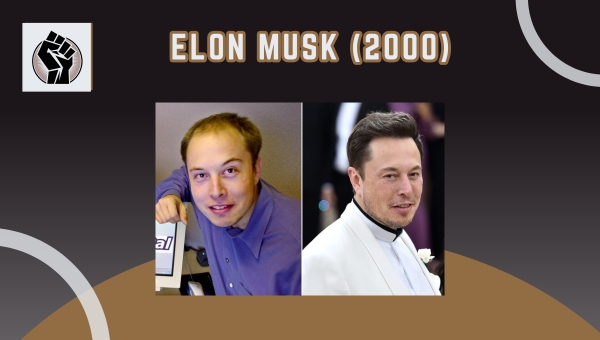
Key Contributions:
- Technological Innovation: Musk emphasized integrating cutting-edge technology to enhance PayPal’s functionality and scalability.
- Unified Platform Vision: He pushed for a unified financial platform that could handle multiple financial services, though this vision clashed with the board, leading to his departure.
Peter Thiel (2000–2002)
After Musk’s exit, Peter Thiel returned as CEO to stabilize the company. His second tenure was focused on guiding PayPal through significant transitions.

Key Contributions:
- eBay Integration: Thiel played a significant role in preparing PayPal for its acquisition by eBay, ensuring a smooth transition for both companies.
- Operational Stability: He worked on addressing internal conflicts and refining PayPal’s business model to align with its growing customer base.
Bill Harris (2002–2004)
As CEO during PayPal’s early years under eBay ownership, Bill Harris brought a focus on regulatory compliance and risk management.
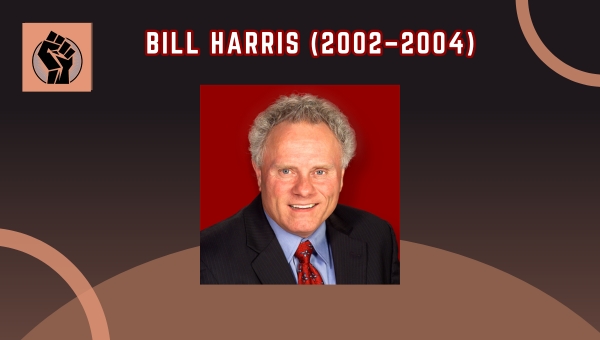
Key Contributions:
- Compliance Framework: Harris implemented policies to ensure PayPal met regulatory standards across various markets.
- Risk Mitigation: He developed systems to minimize financial risks associated with online transactions.
Jeff Jordan (2004–2006)
Jeff Jordan expanded PayPal’s services and significantly increased its user base. His leadership was marked by customer-focused improvements and operational efficiency.
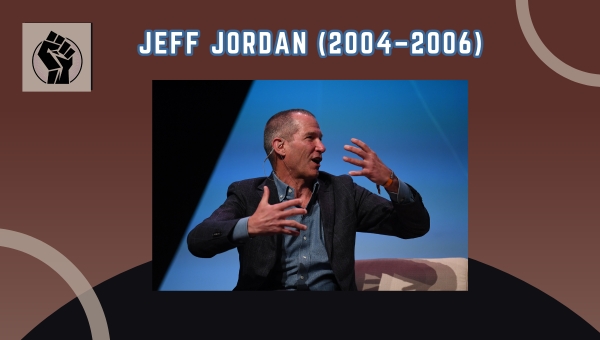
Key Contributions:
- Global Reach: Jordan worked on expanding PayPal’s presence internationally, making it more accessible to global users.
- Customer Experience: He introduced features aimed at improving the user experience, such as streamlined interfaces and faster transaction processing.
Rajiv Dutta (2006–2008)
Rajiv Dutta’s time as CEO was characterized by efforts to solidify PayPal’s position as a market leader in online payments.
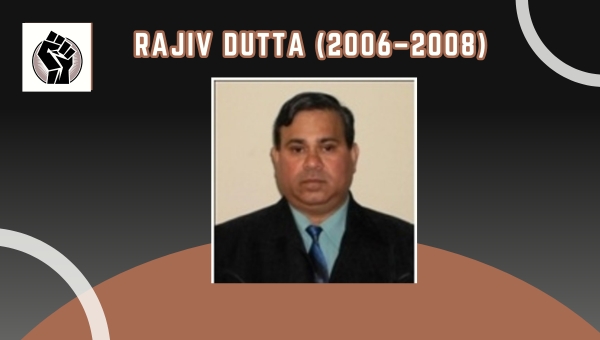
Key Contributions:
- Service Expansion: He oversaw the introduction of new services beyond traditional online payments, diversifying PayPal’s revenue streams.
- Market Leadership: Dutta focused on ensuring PayPal maintained its competitive edge against emerging payment solutions.
Scott Thompson (2008–2012)
Scott Thompson’s leadership marked a transformative era for PayPal, characterized by innovation and significant global expansion.
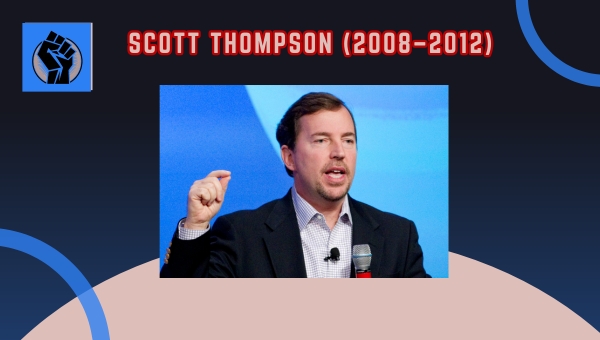
Key Contributions:
- Mobile Payments: Thompson championed mobile payment solutions, enabling users to transact via smartphones and tablets.
- Global Growth: He expanded PayPal’s operations to new markets, making the platform a global powerhouse.
- Security Enhancements: Thompson introduced advanced security measures to protect users from fraud and data breaches.
Dan Schulman (2014–2023)
Dan Schulman’s leadership was transformative, as he led PayPal through one of its most dynamic growth phases. His era saw the company doubling its revenue and entering new markets.
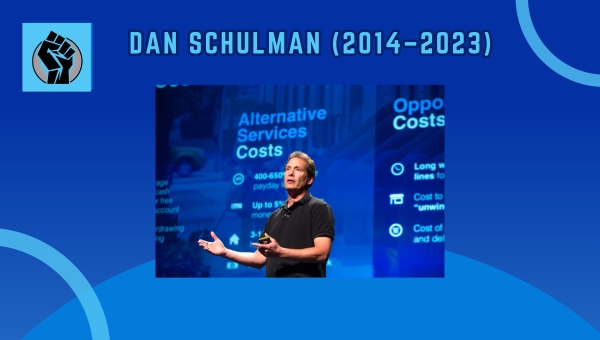
Key Contributions:
- Cryptocurrency Integration: Schulman introduced cryptocurrency transactions, making PayPal one of the first major platforms to embrace this technology.
- Social Impact: He emphasized corporate responsibility, focusing on financial inclusivity and employee welfare.
- Product Diversification: Schulman expanded PayPal’s offerings to include services like buy-now-pay-later, enhancing its value proposition.
Alex Chriss (2023–Present)
Alex Chriss is the current CEO of PayPal, having taken over during a challenging economic period. He aims to steer the company toward innovation while maintaining regulatory compliance.
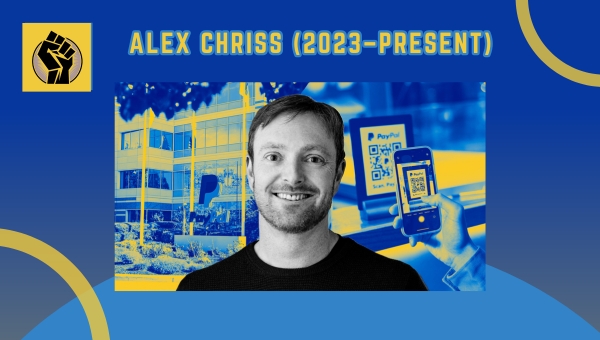
Key Contributions:
- Focus on Growth: Chriss has prioritized innovation to keep PayPal competitive in the evolving fintech landscape.
- Regulatory Navigation: He is addressing increased scrutiny from regulatory authorities, ensuring the company remains compliant while pursuing new opportunities.
Each of these leaders brought a unique set of skills and strategies to the table, contributing to PayPal’s success as a global leader in digital payments. Their collective efforts have ensured the company’s resilience and relevance in a rapidly changing industry.
Leadership Philosophy And Achievements
PayPal’s leadership has consistently focused on driving innovation and staying ahead in the ever-evolving financial landscape. Each leader has contributed uniquely to the company’s success, ensuring its relevance in a competitive industry. Below, we explore the strategic innovations brought by these leaders and their broader impact on global financial technology.
Strategic Innovations
PayPal’s leaders have introduced groundbreaking strategies that have not only enhanced the platform but also redefined the digital payment industry.
Below are some of the key innovations:
- Mobile Payment Systems: PayPal expanded its services to mobile platforms, enabling users to perform transactions seamlessly on smartphones, and making payments more accessible and user-friendly.
- Cryptocurrency Adoption: Under forward-thinking leadership, PayPal ventured into cryptocurrency, allowing users to buy, sell, and hold digital currencies directly on its platform.
- Global Market Penetration: PayPal forged partnerships with international businesses, ensuring its presence in diverse markets, which contributed to its vast global reach.
- Enhanced Fraud Security: Continued improvements in fraud detection and security protocols made PayPal a trusted name in digital payments.
Impact On Global Financial Technology
The influence of PayPal’s leadership extends far beyond the company itself, shaping the financial technology sector as a whole.
Here’s how these contributions have left a mark:
- Standardization of Digital Payments: PayPal set benchmarks for secure and efficient online transactions, influencing the standards adopted by other financial tech companies.
- Advancements in Security: The implementation of advanced security systems has significantly improved the trustworthiness of online payment platforms across the globe.
- Innovation in Payment Solutions: PayPal introduced user-centric tools and features, inspiring similar innovations in the fintech industry.
- Encouraging Financial Inclusion: By offering simplified payment solutions, PayPal has played a role in bringing more individuals into the formal financial system, especially in underserved regions.
These contributions highlight the transformative role of PayPal’s leaders in steering not just the company but also the digital payment industry toward a more innovative future.
Also Read: Wells Fargo Bank CEO: Roles and Insight on 9 Key Figures
Challenges Faced By PayPal CEOs
PayPal’s journey to becoming a leader in the digital payments space has not been without its hurdles. From tackling fierce competition to adjusting to ever-changing regulatory environments, its CEOs have continually had to prove their adaptability and strategic insight.

Let’s explore two critical challenges that have shaped their leadership approaches.
Navigating Competitive Markets
In the fast-paced digital payment industry, competition is fierce, and staying ahead requires constant reinvention. PayPal CEOs have had to contend with rivals both old and new, making strategic decisions to maintain the company’s dominance.
- Emerging Fintech Rivals: The rise of companies like Stripe, Square, and Venmo has pressured PayPal to consistently innovate and offer unique value propositions. Competing with these agile startups has been a significant challenge.
- Traditional Banking Institutions: Established banks with their own digital payment solutions have added complexity to the competitive landscape, requiring PayPal to differentiate itself through superior technology and user experience.
- Market Saturation: With several players vying for dominance in digital payments, standing out has required PayPal to focus on customer trust, streamlined services, and global accessibility.
- Technological Advancements: Competitors leveraging cutting-edge technology, such as blockchain and AI, have pushed PayPal to consistently invest in R&D to stay relevant.
Adapting To Regulatory Changes
Operating in a heavily regulated industry, PayPal’s CEOs have had to navigate a labyrinth of financial laws and data protection policies across different jurisdictions. Meeting these challenges has been crucial for the company’s sustained growth and credibility.
- Global Compliance: PayPal operates in multiple countries, each with its own set of financial regulations. CEOs have had to ensure compliance with diverse legal requirements without compromising operational efficiency.
- Data Privacy Laws: With the rise of stricter privacy laws such as GDPR, securing user data has become a top priority. PayPal’s leaders have implemented robust measures to address these concerns.
- Anti-Money Laundering (AML) Protocols: Maintaining trust in the platform has required adhering to and enhancing AML processes to prevent illicit activities.
- Tax and Financial Reporting: As regulations around digital transactions evolve, PayPal has had to adapt its financial reporting and tax compliance systems, often requiring significant organizational changes.
These challenges underscore the complexity of leading a global fintech giant like PayPal, where success demands a blend of strategic foresight and operational agility.
Legacy And Influence Of PayPal CEOs
The CEOs of PayPal have left a lasting impact not only on the company but also on the broader technology and financial sectors.
Their leadership has driven innovation, set industry benchmarks, and opened new opportunities in the world of digital payments. Here, we’ll explore their contributions to the tech industry and their work in shaping the future of digital payments.
Contributions To The Tech Industry
PayPal’s CEOs have played a pivotal role in advancing technology through their innovative leadership. These contributions have helped redefine how financial transactions are performed in the digital era.
- Pioneering Online Payments: PayPal’s leaders introduced and popularized secure and efficient online payment systems, becoming a global benchmark for digital transactions.
- Driving Security Innovations: They established advanced fraud detection and cybersecurity measures, significantly improving trust in online platforms.
- Encouraging Fintech Growth: Their work has inspired the creation of new fintech startups, fostering growth and competition in the industry.
- Developing Scalable Platforms: PayPal’s leadership has focused on building platforms that handle millions of transactions daily, demonstrating scalability and reliability.
Shaping The Future Of Digital Payments
The strategic actions taken by PayPal’s CEOs have been instrumental in transforming digital payments into what they are today. Their decisions continue to influence the industry and set standards for the future.
- Expanding Accessibility: They have worked towards making digital payments accessible on a global scale, ensuring inclusivity for users in diverse markets.
- Innovating Payment Methods: Introducing mobile wallets, QR code payments, and cryptocurrency options has revolutionized how users interact with money.
- Promoting Seamless Integration: PayPal has been integrated into e-commerce and social platforms, simplifying payment processes for businesses and individuals.
- Enhancing User Experience: The focus on ease of use, intuitive design, and smooth functionality has elevated customer satisfaction in the payment space.
The legacy of these CEOs is a testament to their vision and determination to push boundaries in both technology and financial services. Their influence continues to shape the evolving digital payment ecosystem.
FAQs
When was PayPal founded?
PayPal was founded in December 1998 by Max Levchin, Peter Thiel, and Luke Nosek. It initially aimed to provide secure and efficient digital payment services.
When was PayPal established?
PayPal was officially established in 1998, marking the beginning of its journey in transforming online financial transactions.
How long has PayPal been around?
PayPal has been operating for over two decades, providing innovative payment solutions since its inception in 1998.
Conclusion
The journey of the CEOs of PayPal showcases a blend of visionary leadership, innovation, and adaptability in the ever-evolving digital payments landscape. Each leader has contributed uniquely, leaving a lasting impact on the company and the global financial industry.
From pioneering online payments to embracing modern advancements, their strategies have shaped PayPal into a leading fintech giant. Studying their achievements and challenges provides valuable insights into the dynamics of leadership in a competitive market.
If you found this exploration insightful, don’t miss out on more engaging content to deepen your understanding of leadership and innovation. Visit our blog for more articles on transformative business journeys!





